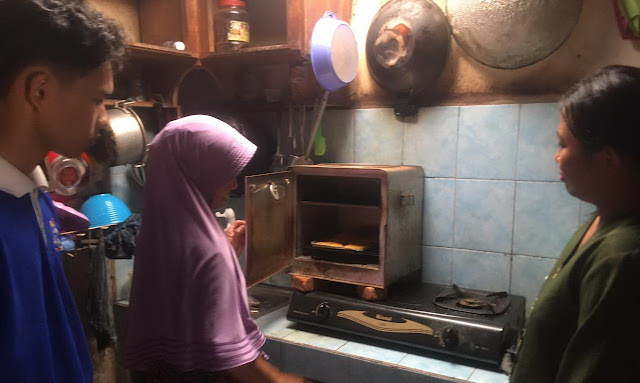By: Reginiana Dosvia.
Bengkulu has a variety of culinary delights with local ingredients which currently continue to compete with various ‘attacks’ of fast-food modern food that millennials like. The Multiplication of Stube HEMAT in Bengkulu and students tried to know, learn and practice making local food of Bengkulu in Kroya village, Pagar Jati district, Central Bengkulu regency. (26/03/2023).
In this village, Bay Tat (Bengkulu juadah) is one of the local specialties. This traditional culinary has shape of rectangular and round shapes, like cookies which are acculturated with the appearance of pies topped with pineapple or cheese. In the past, Bay Tat was known as a special culinary dish for kings in Bengkulu. As times change, now everyone can eat this cookie at parties, celebrations, and as daily gifts. Its shape indicates its regional origin because the round-shaped Bay Tat is derived from South Bengkulu, while the rectangular-shaped characterizes the Bay Tat of Bengkulu and Central Bengkulu. Even though the shape is different, the taste and the manufacturing process are the same.
Bay Tat is made from wheat flour, sugar, pure coconut milk, soda, vanilla, and butter. After the Bay Tat cookie is finished, it will be smeared with traditional pineapple jam. Why pineapple? Pineapple is a potential fruit of Bengkulu because it grows almost in people's homes and fields. It is the main reason why the jam comes from the fruit for Bay Tat toping. How to make the jam is by cooking the pineapple until it crumbles, through stirring for hours until it becomes sweet, fresh, and delicious pineapple jam.
Nur Baiti, an entrepreneur who makes and sells Bay Tat, allowed students to conduct interviews and practice making cookies at her production house. She has been producing it since 2017 and got a potential market. "This cookie is a typical Bengkulu food, a culture passed down from our ancestors, plus the majority of residents in our area of residence are Bengkulu natives (the Rejang ethnic) so this cookie is familiar for them," said Nur Baiti un the interview. ‘Bay’ means mother in the Rejang language, and ‘Tat’ means cookie.
In each production, Nur Baiti needs 5 kgs of flour and it sold out every day, even more flour is needed when there are orders for parties and other traditional events. Orders do not come only from residents living in the same village but also from other villages. Nur also said that she has ever had fail product due to wrong flour which made the cookie hard to eat.
The student participants enjoyed practicing making cookies with Nur Baiti because she taught the participants patiently and joyfully. At a glance, the making is simple, however it is quite complicated for the participants to work on, but the cookies produced by the participants are quite satisfying. With a dense sweet texture, the cookie is quite filling and because of its delicious taste, this cookie is in great demand by many people. The potency of the local culinary like this becomes an opportunity for young people to discover and to develop. Young people must innovate the local potential for global competition. ***




Comments
Post a Comment